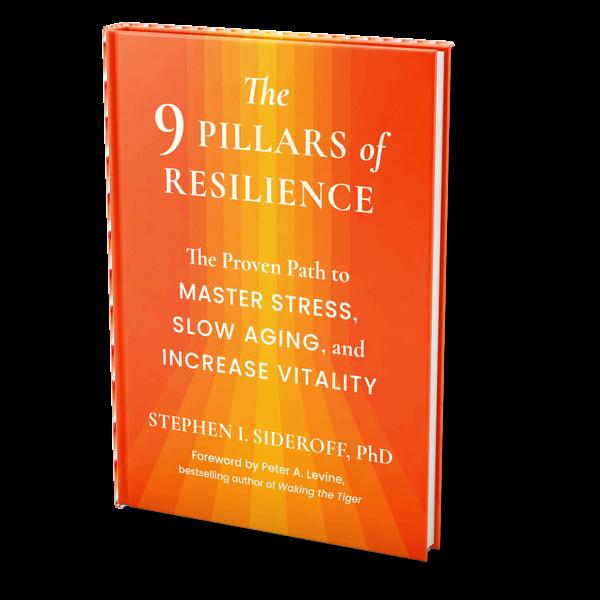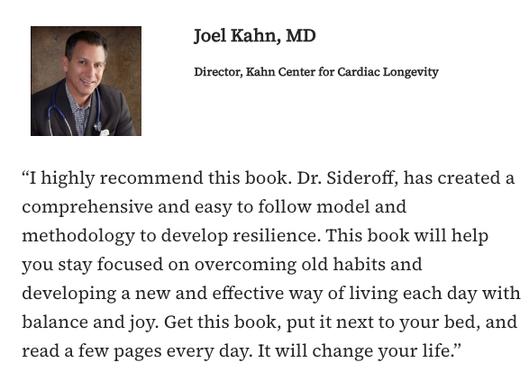THE PATH OF RESILIENCE

A Guided Self-Assessment of How Well You Handle the Stresses of Life & How Optimally You Function
OVERCOME PERSONAL OBSTACLES
SUCCEED PERSONALLY & IN BUSINESS BOUNCE BACK FROM DIVERSITY | |
BY STEPHEN SIDEROFF, PHD
“Aging is simply the sum total of all the stresses we place on our body.”
HANS SELYE, STRESS PIONEER
If you want to be successful, you will experience stress.
If you want to be successful and healthy, you need to discover and develop resilience.
Resilience is the combination of personal qualities that:
•Allow you to thrive with stress
•Enhance personal powers for healing
•Foster recovery from stressful experiences
•Minimize wear and tear on your body
•Improve mental/cognitive functioning
•Improve your relationship with emotions

•Help you feel better about yourself and treat yourself with respect
•Empower you in the world
•Maximize the use of your personal energies
•Support greater longevity
This assessment and workbook introduce you to my model of resilience that helps you function optimally in terms of both health and performance.
Completing the questionnaire and graphing your scores will give you a quick picture of your strengths as well as those areas needing development.
THE NINE PILLARS OF RESILIENCE
Resilience can be divided into three areas: Relationship, Organismic Balance & Mastery and, How You Engage the World.

RELATIONSHIP

ORGANISMIC BALANCE & MASTERY
1. Relationship with Self
2. Relationship with Others
3. Relationship with Something Greater
Cognitive Balance and Mastery
Emotional Balance and Mastery

Presence
Flexibility
Power
What follows is a brief description of each of the pillars. You can learn helpful exercises for improvement along these nine dimensions with Resilient Living or through my six week self-guided program, Resilience.

RELATIONSHIP
1.Relationship with Self:
Perhaps the pillar that all others rest on, this is about how you feel about yourself and how you treat yourself. It is important to treat yourself with: respect, love, compassion, support, acceptance and care. Despite childhood lessons, it’s never constructive to put yourself down, or be hard on yourself. It only creates more tension and undermines confidence. This pillar is about developing a healthy internal voice.
2.Relationship with Others:
This is the ability to communicate and establish close and intimate relationships, and to receive support. Friends and other relationships in which positive affect is expressed, enhances the sense of a safe world. Relationships can serve to validate and reinforce a sense of being okay. This impacts confidence and personal capacity. The ability to be intimate facilitates a physical opening that enhances the flow of energy in your body. At the same time this pillar is about setting appropriate boundaries so you are not hurt by toxic energy.

ORGANISMIC BALANCE & MASTERY
4.Physical Balance and Mastery:
This is the ability to deeply relax and to quickly recover from stress. It is being able to keep your stress response in proportion to the demands of the specific situation and not over-react. And to fully utilize sleep for optimal recuperation.
5.Cognitive Balance and Mastery:
This pillar is about having a positive attitude and positive expectations. It is also the ability to control your thoughts; to let go of thoughts and worry and move on, as well as to be focused and avoid distractions.
3.Relationship with Something Greater:
This can have a spiritual emphasis or it can be your involvement with community, charity or other forms of service. Involvement, meaning and belief in something greater than yourself, can include purpose, and makes daily hassles less significant. It enhances a sense of security and hope. It takes the focus away from your problems. Perhaps most important, it lessens the sense of isolation and alienation, while giving your life meaning and direction. All these factors reduce uncertainty, a major source of stress.
6.Emotional Balance and Mastery:
Unexpressed emotions or emotions that you are unaware of make you more sensitive to hurts and to inappropriate over reactions. They are accompanied by physical holding patterns, anxiety, and stress. This component involves awareness of one’s feelings, the ability to appropriately express these emotions, and then the ability to let go and thus not carry around excess baggage or unfinished business.

PROCESS: HOW YOU ENGAGE THE WORLD
7.Presence
This component is about being fully in the moment, aware and in contact with your environment, and not distracted by thoughts, worry or other preoccupation. It is also about the quality of the energy that you project out into the world and how well you are received by others.
8.Flexibility
This is the ability to adapt to changing circumstances that minimizes frustration, anger and tension. It also includes flexibility in your perception of the world and in how you respond. It is the ability to learn and adjust from experience in order to better meet your needs.
9.Power
I define this as your ability to get things done. This includes courage to take action, persistence in the face of obstacles and frustration, focus in keeping the goal in view, and assertiveness in making your desires known. It also involves the ability to make decisions as well as planning and being strategic. This component enhances your sense of control, and self-trust and confidence.






